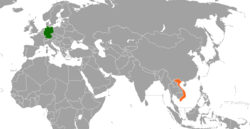Germany–Vietnam relations
This article needs additional citations for verification. (July 2009) |
 | |
Germany |
Vietnam |
|---|---|
German–Vietnamese relations refers to the relationship between Federal Republic of Germany and Socialist Republic of Vietnam. While traditionally they're following two totally different systems, as Germany is a Federal multi-party democratic Republic, while Vietnam is a single-party dictatorship under communist rule, the relationship is friendly due to numerous similarities. Germany hosted a significant Vietnamese immigrants that came during the Vietnam War when North Vietnam and South Vietnam were two different states in the exact similar story happened to Germany when Germany was divided as West Germany and East Germany. However different in reunification resulted with hidden issues between two nations.
Both two countries have direct embassies in two countries. Germany has an embassy in Hanoi while Vietnam has an embassy in Berlin.
Vietnamese immigrants to Germany
At the peak of Vietnam War, the first wave of immigrants came to Germany were North Vietnamese immigrants going to East Germany which was also a communist state. They were friendly and quite close together, thus they went better integrated in East Germany.
However, after the Fall of Saigon, a second massive wave of immigration to Germany, this time, by South Vietnamese refugees, entering to the opposite West Germany which was also more close to the West, resulted which the other integration to Germany that distinct themselves to Vietnamese in East Germany. The different integration would also result with different issues in the future.
Since 1990s
After the reunification of Germany, two Vietnamese communities united into one single community, but as Germany was reunited into a Western-democratic model opposed to Vietnam's communist totalitarianism, East Germany's Vietnamese after reunification found themselves hard to integrate into the new German society due to difficult of connection with West Germany's Vietnamese whom tend to be more close to the West and anti-communist. As the result, they went isolated.
On the other side, due to increasing hostilities due to different features, neo-Nazi groups in Germany and Vietnamese had clashed in a riot known as Hoyerswerda riots at 1991. Since then, there are other smaller incidents against Vietnamese in Germany.
2017 kidnap of Trịnh Xuân Thanh
In 2017, Trịnh Xuân Thanh, a former communist party's member and businessman which was accused for being corrupt, had been secretly abducted and kidnapped in Berlin by a group of unnamed Vietnamese personnel believed to be Vietnamese agents in Germany. In response, Germany accused Vietnam for "violating the territorial rights of Germany" and ordered a total expulsion of a number of Vietnamese foreign officials in Germany. Germany also suspended Vietnamese workers from going to Germany to start for investigation[1].
Vietnam, in the opposite, has refused to see it as a kidnap, instead claiming that Trinh "surrender by his will" and even show on state-controlled medias about Trinh's apologize for his crime. It was refuted by Germany, which later claimed Vietnamese Government "distort information".
Economic relations
Germany is one of the largest investors in Vietnam, while itself also serves as an important trade partner for Vietnam in the European Union.
See also
References
- ^ Berlin 'abduction' of Vietnamese businessman sparks spat http://www.dw.com/en/berlin-abduction-of-vietnamese-businessman-sparks-spat/a-39941556


